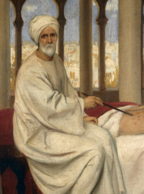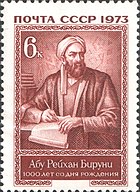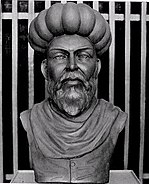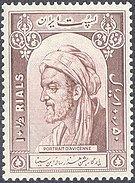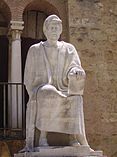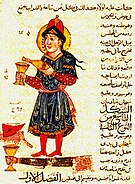The Islamic Golden Age was a period of scientific, economic and cultural flourishing in the history of Islam, traditionally dated from the 8th century to the 13th century.[1][2][3]
This period is traditionally understood to have begun during the reign of the Abbasid caliph Harun al-Rashid (786 to 809) with the inauguration of the House of Wisdom, which saw scholars from all over the Muslim world flock to Baghdad, the world's largest city by then, to translate the known world's classical knowledge into Arabic and Persian.[4] The period is traditionally said to have ended with the collapse of the Abbasid caliphate due to Mongol invasions and the Siege of Baghdad in 1258.[5]
There are a few alternative timelines. Some scholars extend the end date of the golden age to around 1350, including the Timurid Renaissance within it,[6][7] while others place the end of the Islamic Golden Age as late as the end of 15th to 16th centuries, including the rise of the Islamic gunpowder empires.[1][2][3]
- ^ a b Saliba, George (1994). A History of Arabic Astronomy: Planetary Theories During the Golden Age of Islam. New York University Press. pp. 245, 250, 256–257. ISBN 0-8147-8023-7.
- ^ a b King, David A. (1983). "The Astronomy of the Mamluks". Isis. 74 (4): 531–55. doi:10.1086/353360. S2CID 144315162.
- ^ a b Cite error: The named reference
Hassan-Declinewas invoked but never defined (see the help page). - ^ Gutas, Dimitri (1998). Greek Thought, Arabic Culture: The Graeco-Arabic Translation Movement in Baghdad and Early 'Abbāsid Society (2nd-4th/8th-10th Centuries). London: Routledge.[page needed]
- ^ Islamic Radicalism and Multicultural Politics. Taylor & Francis. 1 March 2011. p. 9. ISBN 978-1-136-95960-8. Retrieved 26 August 2012.
- ^ "Science and technology in Medieval Islam" (PDF). History of Science Museum. Retrieved 31 October 2019.
- ^ Ruggiero, Guido (15 April 2008). A Companion to the Worlds of the Renaissance, Guido Ruggiero. John Wiley & Sons. ISBN 978-0-470-75161-9. Archived from the original on 8 November 2016. Retrieved 7 November 2016.
